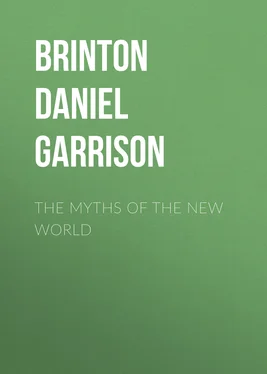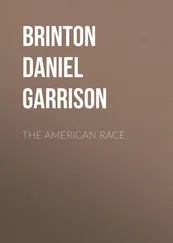Daniel Brinton - The Myths of the New World
Здесь есть возможность читать онлайн «Daniel Brinton - The Myths of the New World» — ознакомительный отрывок электронной книги совершенно бесплатно, а после прочтения отрывка купить полную версию. В некоторых случаях можно слушать аудио, скачать через торрент в формате fb2 и присутствует краткое содержание. Жанр: foreign_prose, История, Старинная литература, Мифы. Легенды. Эпос, foreign_edu, foreign_antique, на английском языке. Описание произведения, (предисловие) а так же отзывы посетителей доступны на портале библиотеки ЛибКат.
- Название:The Myths of the New World
- Автор:
- Жанр:
- Год:неизвестен
- ISBN:нет данных
- Рейтинг книги:5 / 5. Голосов: 1
-
Избранное:Добавить в избранное
- Отзывы:
-
Ваша оценка:
- 100
- 1
- 2
- 3
- 4
- 5
The Myths of the New World: краткое содержание, описание и аннотация
Предлагаем к чтению аннотацию, описание, краткое содержание или предисловие (зависит от того, что написал сам автор книги «The Myths of the New World»). Если вы не нашли необходимую информацию о книге — напишите в комментариях, мы постараемся отыскать её.
The Myths of the New World — читать онлайн ознакомительный отрывок
Ниже представлен текст книги, разбитый по страницам. Система сохранения места последней прочитанной страницы, позволяет с удобством читать онлайн бесплатно книгу «The Myths of the New World», без необходимости каждый раз заново искать на чём Вы остановились. Поставьте закладку, и сможете в любой момент перейти на страницу, на которой закончили чтение.
Интервал:
Закладка:
Let it not be objected that this proposed method of analysis assumes that religions begin and develop under the operation of inflexible laws. The soul is shackled by no fatalism. Formative influences there are, deep seated, far reaching, escaped by few, but like those which of yore astrologers imputed to the stars, they potently incline, they do not coerce. Language, pursuits, habits, geographical position, and those subtle mental traits which make up the characteristics of races and nations, all tend to deflect from a given standard the religious life of the individual and the mass. It is essential to give these due weight, and a necessary preface therefore to an analysis of the myths of the red race is an enumeration of its peculiarities, and of its chief families as they were located when first known to the historian.
Of all such modifying circumstances none has greater importance than the means of expressing and transmitting intellectual action. The spoken and the written language of a nation reveal to us its prevailing, and to a certain degree its unavoidable mode of thought. Here the red race offers a striking phenomenon. There is no other trait that binds together its scattered clans, and brands them as members of one great family, so unmistakably as this of language. From the Frozen Ocean to the Land of Fire, without a single exception, the native dialects, though varying infinitely in words, are marked by a peculiarity in construction which is found nowhere else on the globe, 3 3 It is said indeed that the Yebus, a people on the west coast of Africa, speak a polysynthetic language, and per contra , that the Otomis of Mexico have a monosyllabic one like the Chinese. Max Mueller goes further, and asserts that what is called the process of agglutination in the Turanian languages is the same as what has been named polysynthesis in America. This is not to be conceded. In the former the root is unchangeable, the formative elements follow it, and prefixes are not used; in the latter prefixes are common, and the formative elements are blended with the root, both undergoing changes of structure. Very important differences.
and which is so foreign to the genius of our tongue that it is no easy matter to explain it. It is called by philologists the polysynthetic construction. What it is will best appear by comparison. Every grammatical sentence conveys one leading idea with its modifications and relations. Now a Chinese would express these latter by unconnected syllables, the precise bearing of which could only be guessed by their position; a Greek or a German would use independent words, indicating their relations by terminations meaningless in themselves; an Englishman gains the same end chiefly by the use of particles and by position. Very different from all these is the spirit of a polysynthetic language. It seeks to unite in the most intimate manner all relations and modifications with the leading idea, to merge one in the other by altering the forms of the words themselves and welding them together, to express the whole in one word, and to banish any conception except as it arises in relation to others. Thus in many American tongues there is, in fact, no word for father, mother, brother, but only for my, your, his father, etc. This has advantages and defects. It offers marvellous facilities for defining the perceptions of the senses with the utmost accuracy, but regarding everything in the concrete, it is unfriendly to the nobler labors of the mind, to abstraction and generalization. In the numberless changes of these languages, their bewildering flexibility, their variable forms, and their rapid deterioration, they seem to betray a lack of individuality, and to resemble the vague and tumultuous history of the tribes who employ them. They exhibit an almost incredible laxity. It is nothing uncommon for the two sexes to use different names for the same object, and for nobles and vulgar, priests and people, the old and the young, nay, even the married and single, to observe what seem to the European ear quite different modes of expression. Families and whole villages suddenly drop words and manufacture others in their places out of mere caprice or superstition, and a few years’ separation suffices to produce a marked dialectic difference. In their copious forms and facility of reproduction they remind one of those anomalous animals, in whom, when a limb is lopped, it rapidly grows again, or even if cut in pieces each part will enter on a separate life quite unconcerned about his fellows. But as the naturalist is far from regarding this superabundant vitality as a characteristic of a higher type, so the philologist justly assigns these tongues a low position in the linguistic scale. Fidelity to form, here as everywhere, is the test of excellence. At the outset, we divine there can be nothing very subtle in the mythologies of nations with such languages. Much there must be that will be obscure, much that is vague, an exhausting variety in repetition, and a strong tendency to lose the idea in the symbol.
What definiteness of outline might be preserved must depend on the care with which the old stories of the gods were passed from one person and one generation to another. The fundamental myths of a race have a surprising tenacity of life. How many centuries had elapsed between the period the Germanic hordes left their ancient homes in Central Asia, and when Tacitus listened to their wild songs on the banks of the Rhine? Yet we know that through those unnumbered ages of barbarism and aimless roving, these songs, “their only sort of history or annals,” says the historian, had preserved intact the story of Mannus, the Sanscrit Manu, and his three sons, and of the great god Tuisco, the Indian Dyu. 4 4 Grimm, Geschichte der Deutschen Sprache , p. 571.
So much the more do all means invented by the red race to record and transmit thought merit our careful attention. Few and feeble they seem to us, mainly shifts to aid the memory. Of some such, perhaps, not a single tribe was destitute. The tattoo marks on the warrior’s breast, his string of gristly scalps, the bear’s claws around his neck, were not only trophies of his prowess, but records of his exploits, and to the contemplative mind contain the rudiments of the beneficent art of letters. Did he draw in rude outline on his skin tent figures of men transfixed with arrows as many as he had slain enemies, his education was rapidly advancing. He had mastered the elements of picture writing , beyond which hardly the wisest of his race progressed. Figures of the natural objects connected by symbols having fixed meanings make up the whole of this art. The relative frequency of the latter marks its advancement from a merely figurative to an ideographic notation. On what principle of mental association a given sign was adopted to express a certain idea, why, for instance, on the Chipeway scrolls a circle means spirits , and a horned snake life , it is often hard to guess. The difficulty grows when we find that to the initiated the same sign calls up quite different ideas, as the subject of the writer varies from war to love, or from the chase to religion. The connection is generally beyond the power of divination, and the key to ideographic writing once lost can never be recovered.
Интервал:
Закладка:
Похожие книги на «The Myths of the New World»
Представляем Вашему вниманию похожие книги на «The Myths of the New World» списком для выбора. Мы отобрали схожую по названию и смыслу литературу в надежде предоставить читателям больше вариантов отыскать новые, интересные, ещё непрочитанные произведения.
Обсуждение, отзывы о книге «The Myths of the New World» и просто собственные мнения читателей. Оставьте ваши комментарии, напишите, что Вы думаете о произведении, его смысле или главных героях. Укажите что конкретно понравилось, а что нет, и почему Вы так считаете.












